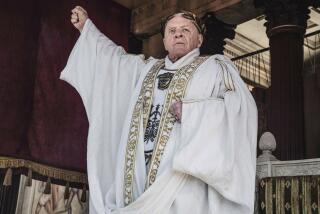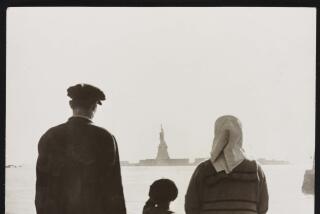The Tale of Resurrection With ‘A.D.’ Background
- Share via
The Kingdom of the Wicked by Anthony Burgess (Arbor House: $18.95)
This is, in a sense, one of the classiest novelizations of all time. This is the book that is the companion piece to last year’s miniseries, “A.D.,” which ran for hours and hours during the Passover/Easter season--the one where the Jews wore striped bathrobes and sat with their knees apart, and the Romans all acted like Roddy McDowall. In fact, one of them probably was Roddy McDowall.
“The amount of research that goes into a popular television series is not clearly to be seen in the finished product, which has to aim at great narrative simplicity, and the conscious elimination of elements that would appeal only to the scholar or the reader of fiction. Thus,” Burgess reveals in an afterword, “ ‘The Kingdom of the Wicked,’ which was partly written for its own sake, partly in anticipation of ‘A.D.,’ may be regarded both as an expansion of the latter and a literary diversion in its own right.”
It can’t be said that we don’t know the story. “Concerning the Resurrection of Jesus,” the alleged chronicler of this story begins, “everyone must believe what he can. For my part, I will not accept miracles if the rational lies to hand, and I have no proof that Jesus died on the cross. . . .”
Holed Up in Alps
This teller of the tale is holed up in the Alps, a little less than a hundred years after the death (and Resurrection?) of that Christ. He writes, he tells us, in demotic Greek: “My Greek is not the tongue of Homer and Aeschylus but a sloppy ungrammatical Sabir lacking Attic salt and tending to a saccharinity which sets my teeth on edge. This property is not in the writer but in the language. I could have written in Latin or even Aramaic, though my spelling of the latter is shaky. I know also a debased kind of Punic . . . whoever translates this, if it is ever to be translated, may be rendering me into the barks of the Goths or the cooings of the Celts, by grace of the alphabet of Rome. Latin itself is too cold and legalistic. . . .”
This storyteller, Sadoc the son of Azor, is finishing a project begun from far away in time, about events far away in place. We are asked to believe that Sadoc, living out his days in cold, mountainous, misty Helvetia, is conjuring up in his imagination those first confused days after the Resurrection of Christ in Jerusalem. Jesus survived, Sadoc concludes, because he had massive lungs, with air left in them, and he merely got up again, after a three days’ rest. The apostles are embarrassed by him, they don’t know what to say. He always was way too much for them. Then, Jesus really is gone, and the apostles mope around the house until the feast of Pentecost, which Sadoc/Burgess reminds us rather testily simply means 50 days after Passover. . . . Then the tongues of fire come down. And the apostles lose their fear.
Sadoc suggests that the reason all the people in the streets then were able to understand them is because they--for a short time--were given the ability to speak the purest Greek. (Is this less or more of a miracle than the ability to speak in many tongues?) And afterward, the apostles consider, comparing dreams, visions, insights: Yes, of course, there is a stern and uncompromising God the Father. And yes, they knew Jesus, who they are convinced is the long-awaited Messiah, a God the Son. But what about this wind, this fiery Spirit, who flew in at them like a fierce bird and gave them such courage and strength? It must be a . . . Third Person, the Holy Spirit. And yet they are all One. . . .
And so on. It must depend on the reader’s nature whether he or she finds these imagined conversations inspirational, interesting, or grindingly embarrassing. In a sense Burgess is hiding ; behind the conventions of television when he speaks of “A.D.,” and behind his aging narrator exiled in Helvetia: “The opinions, interpretations, errors, falsifications and ultimate pessimism of the supposed author are not always mine,” he says in his afterword. But what are we supposed to make of this bizarre retelling of a story we’ve had thrashed into us by way of Sunday School, catechism, Gibbon’s “Decline and Fall of the Roman Empire,” and a thousand other channels?
Hard Times for the Empire
Anyway, as the apostles begin to go about telling the story of Christos--no, not Chrestos, the slave, that’s a whole other guy--the narrator takes us once again into the office of Pontius Pilate (if ever there was a man in the wrong place at the wrong time, it has to be Pilate), and we hear that the Roman Empire has fallen on hard times. Tiberius Claudius Nero. A sex fiend, to put it kindly. Plain fiend would be more like it. His successor? Caligula. Good grief! What an awful person. And things will get worse before they get better. Messalina. Agrippina. Poor old stuttering Claudius. Then Nero. The Empire is going down the drain.
And in Jerusalem the Jews are putting up a mighty fight against the apostles, so much so that just to avoid trouble they go out into the teeming Mediterranean world to tell about the man who said if you were able to love your enemies, the chances were you could get to live an eternal afterlife, with your own personality attributes right there with you to enjoy it.
Sadoc/Burgess asks often through this long and complex narrative of events we already know about, what should a powerful divine being, having created the world, care about decent, day-to-day morality? Implicit in this is a set of questions about morality. Jesus befriended prostitutes; Paul loathed women and sex and was a ferocious (but courageous) grump who loved to persecute people. Had Paul remained Saul, an enthusiastic hater of Christians, that set of beliefs would be different. . . . But certain questions remain completely unanswered. Why were those Roman rulers so downright nuts? Burgess/Sadoc suggests lead poisoning. But why would that pertain only to the rulers? Why, back in Jerusalem, were the folks so obsessed with circumcision? Why refer to the “muck of the desert,” when a desert is dry , for Heaven’s sake, dry?
Mostly, why take on this project, when for all its learning, both genuine and false, nothing new in terms of insight or information appears to be added? Burgess won’t tell; he’s working on the next miniseries, according to TV Guide. And Sadoc is unavailable for comment.
More to Read
Sign up for our Book Club newsletter
Get the latest news, events and more from the Los Angeles Times Book Club, and help us get L.A. reading and talking.
You may occasionally receive promotional content from the Los Angeles Times.










